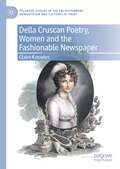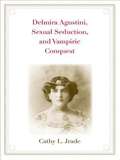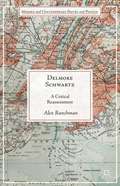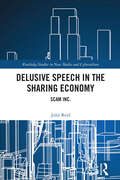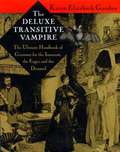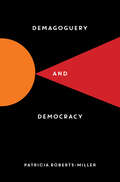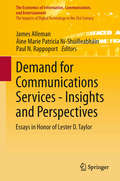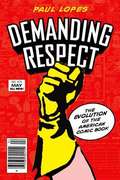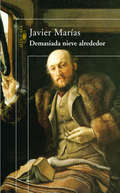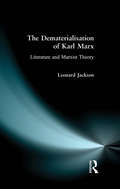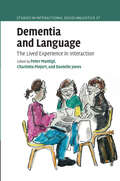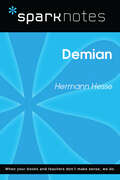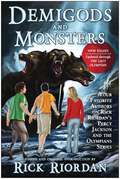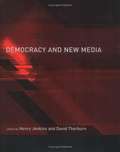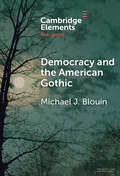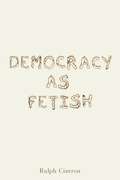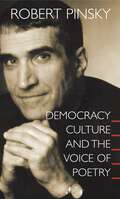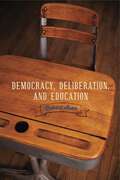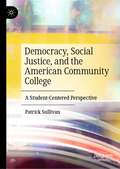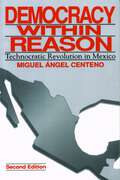- Table View
- List View
Della Cruscan Poetry, Women and the Fashionable Newspaper (Palgrave Studies in the Enlightenment, Romanticism and Cultures of Print)
by Claire KnowlesThis book explores Della Cruscan poetry in the late eighteenth-century literary scene. A sociable, ornate, and deeply theatrical type of poetry, Della Cruscanism was associated with writers like Robert Merry, Mary Robinson, and Hannah Cowley. While Merry is the poet most commonly associated with the Della Cruscan school, this book argues that Della Cruscanism was a movement dominated by female poets and that this was one of the key reasons for the later disavowal and downgrading of its poetic accomplishments. It offers a close examination of these women writers and their role in shaping the poetic culture of the fashionable newspaper. In doing so, this study offers the first account of the feminization of the fashionable newspaper and of popular literary culture in the final years of the eighteenth century.
Delmira Agustini, Sexual Seduction, and Vampiric Conquest
by Cathy L. JradeDelmira Agustini (1886–1914) has been acclaimed as one of the foremost modernistas and the first major woman poet of twentieth-century Spanish America. Critics and the reading public alike were immediately taken by the originality and power of her verse, especially her daring eroticism, her inventive appropriation of vampirism, and her morbid embrace of death and pain No work until now, however, has shown how her poetry reflects a search for an alternative, feminized discourse, a discourse that engages in an imaginative dialogue with Rubén Darío’s recourse to literary paternity and undertakes an audacious rewriting of social, sexual, and poetic conventions. In the first major exploration of Agustini’s life and work, Cathy L. Jrade examines her energizing appropriation and reinvention of modernista verse and the dynamics of her breakthrough poetics, a poetics that became a model for later women writers.
Delmore Schwartz
by Alex RunchmanTaking as its starting point Delmore Schwartz's self-appointment as both a 'poet of the Hudson River' and 'laureate of the Atlantic, ' this book comprehensively reassesses the poetic achievement of a critically neglected writer. Runchman reads Schwartz's poetry from In Dreams Begin Responsibilities to the posthumously-published Last & Lost Poems in relation to its national and international perspectives, recognizing tensions between the two but arguing that these more often animate his writing than hold it back. Addressing Schwartz's Jewish-American heritage, his attempts to negotiate the influence of T. S. Eliot, his use of allusion, his writing about the city, his responses to World War II, and his later poetry's euphonic symbolism, Delmore Schwartz: A Critical Reassessment reestablishes Schwartz's importance to his peers and successors. "
Delusive Speech in the Sharing Economy: Scam Inc. (Routledge Studies in New Media and Cyberculture)
by Julie ReidIn this examination of how the rise of online sharing economy platforms has facilitated online crime, this book shows how, while marketed as trustworthy peer-to-peer services, these platforms are highly vulnerable to misuse by scammers and are used for the dissemination of delusive speech.The analysis centres around the concept of delusive speech, a sub-set of disinformation, designed to deceive and motivate by criminal intent. Looking beyond the economic and disruptive impacts of sharing economy platforms like Uber, Airbnb, and others, this book situates these Big Tech giants as mass communication channels that are frequently misused by bad actors to distribute dangerous content globally. Drawing from over 600 cases of victims lured into scams or physical danger via misleading Airbnb listings, the book provides a detailed case study exposing Airbnb's failure to establish legitimate safety measures despite branding its platform as a 'community of trust'. Incorporating netnography and thematic analysis, the author theorises the deceptive semiotic structure of delusive speech and evaluates practical mechanisms Airbnb could employ to prevent scams and crime on its platform.With a global audience including researchers in communication and media studies, digital media, and media industries, as well as tech journalists, Silicon Valley critics, policymakers, and digital rights advocates, this book unmasks how sharing economy giants like Airbnb contribute to an epidemic of online deception causing real-world harm.
The Deluxe Transitive Vampire: A Handbook Of Grammar For The Innocent, The Eager And The Doomed
by Karen Elizabeth GordonPlayful and practical, this is the style book you can't wait to use, a guide that addresses classic questions of English usage with wit and the blackest of humor. Black-and-white illustrations throughout.
Demagoguery and Democracy
by Patricia Roberts-MillerA clear-eyed guide to demagoguery—and how we can defeat it What is demagoguery? Some demagogues are easy to spot: They rise to power through pandering, charisma, and prejudice. But, as professor Patricia Roberts-Miller explains, a demagogue is anyone who reduces all questions to us vs. them. Why is it dangerous? Demagoguery is democracy’s greatest threat. It erodes rational debate, so that intelligent policymaking grinds to a halt. The idea that we never fall for it—that all the blame lies with them—is equally dangerous. How can we stop it? Demagogues follow predictable patterns in what they say and do to gain power. The key to resisting demagoguery is to name it when you see it—and to know where it leads.
Demand for Communications Services - Insights and Perspectives
by James Alleman Áine Marie Patricia Ní-Shúilleabháin Paul N. RappoportThis volume grew out of a conference organized by James Alleman and Paul Rappoport, conducted on October 10, 2011 in Jackson Hole, Wyoming, in honor of the work of Lester D. Taylor, whose pioneering work in demand and market analysis has had profound implications on research across a wide spectrum of industries In his Prologue, Eli M. Noam notes that demand analysis in the information sector must recognize the "public good" characteristics of media products and networks, while taking into account the effects of interdependent user behavior; the strong cross-elasticities in a market; as well as the phenomenon of supply creating its own demand The second Prologue, by Timothy Tardiff and Daniel Levy, focuses more specifically on Taylor's body of work, in particular its practical applications and usefulness in analyses of, and practices within, the Information and Communications Technology (ICT) sector (known in Europe and elsewhere as the Telecommunications, Media, and Technology (TMT) sector) The remainder of the book is organized into four parts: Advances in Theory; Empirical Applications; Evidence-Based Policy Applications; and a final Conclusion The book closes with an Appendix by Sharon Levin and Stanford Levin detailing Taylor's contributions using bibliometrics. Not only featuring chapters from distinguished scholars in economics, applied sciences, and technology, this volume includes two contributions directly from Lester Taylor, providing unique insight into economics from a lifetime in the field. "What a worthy book! Every applied researcher in communications encounters Lester Taylor's work. Many empirical exercises in communications can trace their roots to Taylor's pioneering research and his thoughtful leadership. This book assembles an impressive set of contributors and contributions to honor Taylor. No surprise, the collection extends far and wide into many of the core topics of communications and media markets. The emphasis is where it should be-on important and novel research questions informed by useful data --Shane Greenstein, Professor of Management and Strategy, Kellogg School of Management, Northwestern University "For more than 40 years, Lester Taylor has been a leader in the application of consumer modeling, econometric techniques and microeconomic data to understand residential and business user behavior in telecommunications markets. During that time, he inspired a cadre of students and colleagues who applied this potent combination to address critical corporate and regulatory issues arising in the telecommunications sector. This volume collects the recent product of many of these same researchers and several other devotees who go beyond empirical analysis of fixed line service by extending Prof. Taylor's approach to the next wave of services and technologies. These contributions, including two new papers by Prof. Taylor, offer an opportunity for the next generation to learn from his work as it grapples with the pressing issues of consumer demand in the rapidly evolving digital economy. " -- Glenn Woroch, Adjunct Professor of Economics, University of California, Berkeley
Demanding Respect: The Evolution of the American Comic Book
by Paul LopesHow is it that comic books—the once reviled form of lowbrow popular culture—are now the rage for Hollywood blockbusters, the basis for bestselling video games, and the inspiration for literary graphic novels? In Demanding Respect, Paul Lopes immerses himself in the discourse and practices of this art and subculture to provide a social history of the American comic book over the last 75 years. Lopes analyzes the cultural production, reception, and consumption of American comic books throughout American history. He charts the rise of superheroes, the proliferation of serials, and the emergence of graphic novels. Demanding Respect explores how comic books born in the 1930s were perceived as a “menace” in the 1950s, only to later become collectors’ items and eventually “hip” fiction in the 1980s through today. Using a theoretical framework to examine the construction of comic book culture—the artists, publishers, readers and fans—Lopes explains how and why comic books have captured the public’s imagination and gained a fanatic cult following.
Demasiada nieve alrededor
by Javier MaríasEste volumen recoge noventa y seis artículos publicados entre febrero de 2005 y febrero de 2007, es decir, el tercer y el cuarto año de las colaboraciones de Javier Marías en El País Semanal. Dice el autor en su prólogo: «En España cada vez sirve de menos desmentir una información o desbaratar una creencia o echar por tierra una teoría; o explicar algo pacientemente, o rebatir opiniones, o demostrar lo ridículo o absurdo de una postura o de una costumbre o de una política. O razonar, en suma. Y así, la realidad española se repite infatigablemente, con una tendencia enfermiza a no escuchar ni enmendarse casi nunca, todavía menos a reconocer un error o una falacia y a disculparse por ellos. Esta actitud de fingir no haberse enterado es algo instalado en la sociedad, lo que antiguamente se llamaba "un vicio". El mensaje que yo suelo recibir es este: No me importa lo que usted ha dicho. Ni siquiera que me haya convencido con sus argumentos. Ni siquiera que yo vea que lleva razón. Yo voy a seguir en lo mío, como si usted no hubiera hablado. No se esfuerce, porque yo tengo un escudo infalible, lo que en nuestra lengua se llama "oídos sordos". Es muy fuerte, por tanto, la tentación de callarse, y antes o después sucumbiré a ella. A los lectores individuales que sí se dan por enterados, no sé si debo agradecerles o reprocharles que me lo hayan impedido hasta ahora». A nosotros no nos cabe duda: a autores como Javier Marías hay que agradecerles que, pese a todo, sigan hablando.
Los demasiados libros (Colección Argumentos/anagrama Ser. #Vol. 183)
by Gabriel ZaidReflexión aguda, sensata, amorosa que deben leer lectores, autores, editores, libreros... Una nueva edición, corregida y aumentada. Hay en la experiencia de leer una felicidad y libertad que resultan adictivas. La lectura libera. Se extiende a leer la vida, a leer quiénes somos y en dónde estamos. Anima las conversaciones de lector a lector. Se contagia por los lectores en acción: padres, maestros, amigos, escritores, traductores, críticos, editores, tipógrafos, libreros, bibliotecarios y otros promotores del vicio de leer. "Gabriel Zaid es capaz de observar el mundo de las letras desde la perspectiva otorgada por otras disciplinas. Su gran acierto es la virtud del poeta: decir lo que oscuramente habíamos intuido sin alcanzar a formularlo en palabras. Señala que el verdadero problema del libro es que el estrato privilegiado que ha hecho estudios universitarios no lee: nunca le ha dado el golpe a la lectura, nunca ha llegado a saber realmente lo que es leer. Esto, que sepamos, nadie lo había dicho." José Emilio Pacheco
Los demasiados libros
by Gabriel ZaidHay en la experiencia de leer una felicidad y libertad que resultan adictivas. La lectura libera. Se extiende a leer la vida, a leer quiénes somos y en dónde estamos. Anima las conversaciones de lector a lector. Se contagia por los lectores en acción: padres, maestros, amigos, escritores, traductores, críticos, editores, tipógrafos, libreros, bibliotecarios y otros promotores del vicio de leer. Gabriel Zaid es capaz de observar el mundo de las letras desde la perspectiva otorgada por otras disciplinas. Su gran acierto es la virtud del poeta: decir lo que oscuramente habíamos intuido sin alcanzar a formularlo en palabras. Señala que el verdadero problema del libro es que el estrato privilegiado que ha hecho estudios universitarios no lee: nunca le ha dado el golpe a la lectura, nunca ha llegado a saber realmente lo que es leer. Esto, que sepamos, nadie lo había dicho.
The Dematerialisation of Karl Marx: Literature and Marxist Theory (Foundations Of Modern Literary Theory Ser.)
by Leonard JacksonThis volume constitutes both an attack on modern left wing literary theory - the main product of the last Marxist renaissance in the past thirty years - and a defence of the one element of Marxism which, in the general collapse, modern theorists have been happiest to lose, its economic materialism. It traces Marxist theory from its beginnings in Hegelian idealism to its end in Althusser's structuralism, and concludes that while Marxist economics will not work, and the type of revolution prophesied was fantasy, the principle of historical materialism remains intact and defensible. This will be a key text in literary and cultural studies as well as being of interest to students on philosophy and sociology courses.
Dementia and Language: The Lived Experience in Interaction (Studies in Interactional Sociolinguistics)
by Peter Muntigl Charlotta Plejert Danielle JonesBringing together cutting-edge research from a group of international scholars, this innovative volume examines how people with dementia interact with others in a variety of social contexts, ranging from everyday conversation to clinical settings. Drawing on methods from conversation analysis, it sheds light on how people with dementia accomplish relevant goals in interaction, as well as how changes in an individual's discursive abilities may affect how conversationalists negotiate a world in common and continue to build their social relationships. By exploring interaction, this book breaks new ground in challenging the commonplace assumptions about what constitutes typical or atypical interactions in communication involving people with dementia, and further demonstrates the unique and creative strategies all speakers employ to facilitate better and more collaborative communication. It is essential reading for academic researchers and advanced students across sociolinguistics, interactional linguistics and conversational analysis, as well as health care practitioners.
Demian (SparkNotes Literature Guide Series)
by SparkNotesDemian (SparkNotes Literature Guide) by Hermann Hesse Making the reading experience fun! Created by Harvard students for students everywhere, SparkNotes is a new breed of study guide: smarter, better, faster.Geared to what today's students need to know, SparkNotes provides:chapter-by-chapter analysis explanations of key themes, motifs, and symbols a review quiz and essay topics Lively and accessible, these guides are perfect for late-night studying and writing papers.
Demigods and Monsters: Your Favorite Authors on Rick Riordan's Percy Jackson and the Olympians Series
by Rick Riordan and Leah WilsonWhich Greek god makes the best parent? Would you want to be one of Artemis' Hunters? Why do so many monsters go into retail? Spend a little more time in Percy Jackson's world—a place where the gods bike among us, monsters man snack bars, and each of us has the potential to become a hero. Find out: Why Dionysus might actually be the best director Camp Half-Blood could have How to recognize a monster when you see one Why even if we aren't facing manticores and minotaurs, reading myth can still help us deal with the scary things in our own lives Plus, consult our glossary of people, places, and things from Greek myth: how Medusa got her snake hair extensions, why Chiron isn't into partying and paintball like the rest of his centaur family, and the whole story on Percy's mythical namesake.
Democracy and Media Decadence
by John KeaneWe live in a revolutionary age of communicative abundance in which many media innovations - from satellite broadcasting to smart glasses and electronic books - spawn great fascination mixed with excitement. In the field of politics, hopeful talk of digital democracy, cybercitizens and e-government has been flourishing. This book admits the many thrilling ways that communicative abundance is fundamentally altering the contours of our lives and of our politics, often for the better. But it asks whether too little attention has been paid to the troubling counter-trends, the decadent media developments that encourage public silence and concentrations of unlimited power, so weakening the spirit and substance of democracy. Exploring examples of clever government surveillance, market censorship, spin tactics and back-channel public relations, John Keane seeks to understand and explain these trends, and how best to deal with them. Tackling some tough but big and fateful questions, Keane argues that 'media decadence' is deeply harmful for public life.
Democracy and New Media
by Henry Jenkins David ThorburnDigital technology is changing our politics. The World Wide Web is already a powerful influence on the public's access to government documents, the tactics and content of political campaigns, the behavior of voters, the efforts of activists etc.
Democracy and the American Gothic (Elements in the Gothic)
by Michael J. BlouinWhile the political undercurrent of the American Gothic has been firmly established, few scholars have surveyed the genre's ambivalent relationship to democracy. The American Gothic routinely undercuts centralised authority by exposing the dark underbelly of the status quo; at the same time, the American Gothic tends to reflect a widespread mistrust of the masses. American readers are too afraid of democracy – and not yet fearful enough. This concise Element theorises the democratic and anti-democratic elements of the American Gothic by surveying the conflicted imaginaries of the genre's mainstays, including Charles Brockden Brown, Edgar Allan Poe, Shirley Jackson, and Stephen King.
Democracy and the Politics of Silence (Rhetoric and Democratic Deliberation)
by Mónica Brito VieiraMost people equate democracy with discussion, speech, and making one’s voice heard. But where does silence fit in? Democracy and the Politics of Silence investigates the largely overlooked role of silence in democratic politics. It challenges conventional wisdom by arguing that silence can support and affirm democratic pillars and outcomes like empowerment, inclusion, and equality.The book focuses on a particular set of problems concerning the relationship between political silence and the democratic triad of voice, agency, and representation. Each of the book’s chapters draws on a selection of hand-picked case studies, both historical and contemporary, including the NAACP’s Silent Parade in 1917, demonstrations by the Women in Black, Spain’s post-Franco Pact of Forgetting, Trump’s silent majority, debates related to the representation of nonhuman beings, and the famous Miranda judgment on the right to silence. Together they offer an innovative, ambitious investigation of democratically undesirable silences and practices of silence that are powerfully affirmative of democratic subjectivities, aims, and norms. In thus expanding the repertoire of democratic citizenship, Mónica Brito Vieira invites readers to consider what silence might teach them about democracy.This timely book should appeal to political science students and scholars as well as anyone interested in the history of democracies and popular resistance movements.
Democracy as Fetish (RSA Series in Transdisciplinary Rhetoric #13)
by Ralph CintronDemocracy has long been fetishized. Consequently, how we speak about democracy and what we expect from democratic governance are at odds with practice. With unflinching resolve, this book probes the theory of democracy and how the left and right are fascinated by it.In this innovative multidisciplinary study, Ralph Cintron provides sustained analysis of our political discourse. He shows not only how the rhetoric of democracy produces strong desires for social order, global wealth, and justice but also how these desires cannot be satisfied. Throughout his discussion, Cintron includes ethnographic research from fieldwork conducted over the course of twenty years in the Latino neighborhoods of Chicago, where he observes both citizens and the undocumented looking to democracy to fulfill their highest aspirations. Politicians hand out favors to the elite, developers strong-arm aldermen, and the disenfranchised have little redress. The problem, Cintron argues, is that the conditions required to put democracy into practice—territory, a bordered nation-state, citizens, property—are constituted by inequality and violence, because there is no inclusivity that does not also exclude.Drawing on ethnography, economics, political theory, and rhetorical analysis, Cintron makes his case with tremendous analytic rigor. This challenge to reassess the discourses on democracy and to consider democratic politics as always compromised by oligarchy will be of particular interest to political and rhetorical theorists.
Democracy as Fetish (RSA Series in Transdisciplinary Rhetoric)
by Ralph CintronDemocracy has long been fetishized. Consequently, how we speak about democracy and what we expect from democratic governance are at odds with practice. With unflinching resolve, this book probes the theory of democracy and how the left and right are fascinated by it.In this innovative multidisciplinary study, Ralph Cintron provides sustained analysis of our political discourse. He shows not only how the rhetoric of democracy produces strong desires for social order, global wealth, and justice but also how these desires cannot be satisfied. Throughout his discussion, Cintron includes ethnographic research from fieldwork conducted over the course of twenty years in the Latino neighborhoods of Chicago, where he observes both citizens and the undocumented looking to democracy to fulfill their highest aspirations. Politicians hand out favors to the elite, developers strong-arm aldermen, and the disenfranchised have little redress. The problem, Cintron argues, is that the conditions required to put democracy into practice—territory, a bordered nation-state, citizens, property—are constituted by inequality and violence, because there is no inclusivity that does not also exclude.Drawing on ethnography, economics, political theory, and rhetorical analysis, Cintron makes his case with tremendous analytic rigor. This challenge to reassess the discourses on democracy and to consider democratic politics as always compromised by oligarchy will be of particular interest to political and rhetorical theorists.
Democracy, Culture and the Voice of Poetry (The University Center for Human Values Series #27)
by Robert PinskyThe place of poetry in modern democracy is no place, according to conventional wisdom. The poet, we hear, is a casualty of mass entertainment and prosaic public culture, banished to the artistic sidelines to compose variations on insipid themes for a dwindling audience. Robert Pinsky, however, argues that this gloomy diagnosis is as wrongheaded as it is familiar. Pinsky, whose remarkable career as a poet itself undermines the view, writes that to portray poetry and democracy as enemies is to radically misconstrue both. The voice of poetry, he shows, resonates with profound themes at the very heart of democratic culture. There is no one in America better to write on this topic. One of the country's most accomplished poets, Robert Pinsky served an unprecedented two terms as America's Poet Laureate (1997-2000) and led the immensely popular multimedia Favorite Poem Project, which invited Americans to submit and read aloud their favorite poems. Pinsky draws on his experiences and on characteristically sharp and elegant observations of individual poems to argue that expecting poetry to compete with show business is to mistake its greatest democratic strength--its intimate, human scale--as a weakness. As an expression of individual voice, a poem implicitly allies itself with ideas about individual dignity that are democracy's bedrock, far more than is mass participation. Yet poems also summon up communal life.. Even the most inward-looking work imagines a reader. And in their rhythms and cadences poems carry in their very bones the illusion and dynamic of call and response. Poetry, Pinsky writes, cannot help but mediate between the inner consciousness of the individual reader and the outer world of other people. As part of the entertainment industry, he concludes, poetry will always be small and overlooked. As an art--and one that is inescapably democratic--it is massive and fundamental.
Democracy, Deliberation, and Education (Rhetoric and Democratic Deliberation #13)
by Robert AsenThe local school board is one of America’s enduring venues of lay democracy at work. In Democracy, Deliberation, and Education, Robert Asen takes the pulse of this democratic exemplar through an in-depth study of three local school boards in Wisconsin. In so doing, Asen identifies the broader democratic ideal in the most parochial of American settings. Conducted over two years across racial, ethnic, and socioeconomic lines, Asen’s research reveals as much about the possibilities and pitfalls of local democracy as it does about educational policy. From issues as old as racial integration and as contemporary as the recognition of the Gay-Straight Alliance in high schools, Democracy, Deliberation, and Education illustrates how ordinary folks build and sustain their vision for a community and its future through consequential public decision making.For all the research on school boards conducted in recent years, no other project so directly addresses school boards as deliberative policymaking bodies. Democracy, Deliberation, and Education draws from 250 school-board meetings and 31 interviews with board members and administrators to offer insight into participants’ varied understandings of their roles in the complex mechanism of governance.
Democracy, Social Justice, and the American Community College: A Student-Centered Perspective
by Patrick SullivanThis book provides scholars, educators, and legislators with a personal, classroom-level tour of daily life at a community college. Readers will accompany the author into the classroom as he goes about his work as an English teacher meeting with classes and corresponding with students on Blackboard and e-mail. Answering the call for ”student-centered scholarship,” this book blends traditional academic writing with chapters that feature a rich variety of student work, including essays, journal entries, poems, art, and responses to creative assignments. In this volume, Sullivan theorizes the modern community college as a social justice institution. By mission and mandate, the modern community college has democratized America’s system of higher education and distributed hope, equity, and opportunity more broadly across the nation.
Democracy Within Reason: Technocratic Revolution in Mexico
by Miguel Angel CentenoDuring the 1980s the Mexican regime faced a series of economic, social, and political disasters that led many to question its survival. Yet by 1992 the economy was again growing, with inflation under control and the confidence of international investors restored. Mexico was now touted as an example for regimes in Eastern Europe to emulate.How did Carlos Salinas and his team of technocrats manage to gain political power sufficient to impose their economic model? How did they sustain their revolution from above despite the hardships these changes brought for many Mexicans? How did they stage their remarkable political comeback and create their “democracy within reason”? Why did Salinas succeed in keeping control of his revolution while Mikhail Gorbachev failed to do so in his similar effort at radical reform?Miguel Centeno addresses these questions by analyzing three critical developments in the Mexican state: the centralization of power within the bureaucracy; the rise of a new generation of technocrats and their use of a complex system of political networks; and the dominance of a neoliberal ideology and technocratic vision that guided policy decisions and limited democratic participation. In his conclusion the author proposes some alternative scenarios for Mexico’s future, including the role of NAFTA, and suggests lessons for the study of regimes undertaking similar transitions.Of obvious interest to students of contemporary Mexico and Latin America, the book will also be very useful for those analyzing the transition to the market in other countries, the role of knowledge in public policy, and the nature of the modern state in general.
